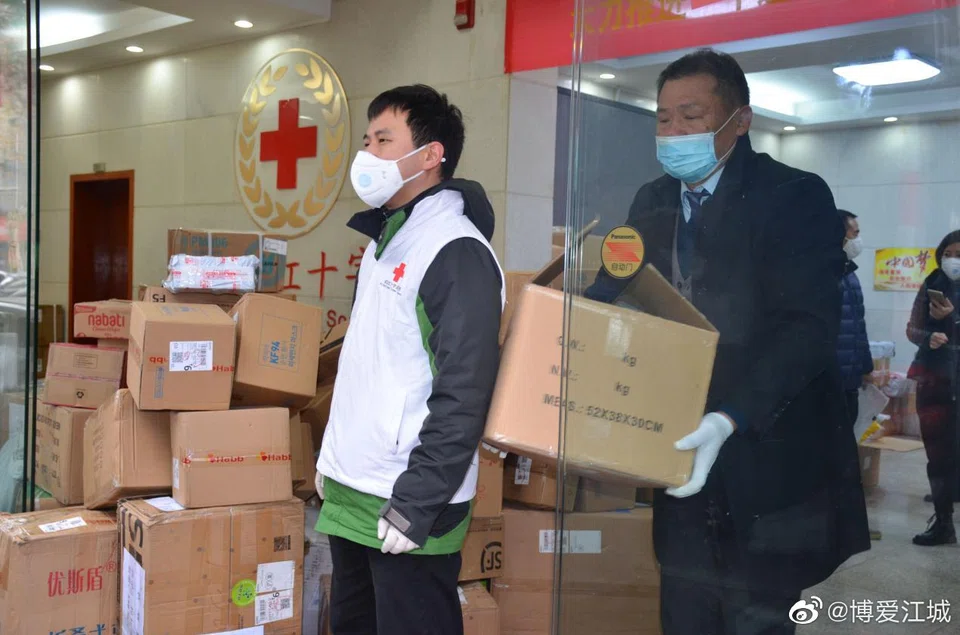Wuhan coronavirus: Hubei and Wuhan Red Cross Society officials draw flak
Poor handling of the Wuhan coronavirus epidemic continues to incur public wrath. This time, China's Red Cross fields tough questions as to why donated supplies are not reaching those in need.

As the Wuhan coronavirus (2019-nCoV) outbreak escalates, Chinese society continues to question the authorities' poor handling of the situation. First it was the Chinese Center for Disease Control and Prevention. Now, the Red Cross Society in Hubei and Wuhan have come under attack for their inefficiency and ineptitude in distributing masks and medical supplies.
In response to the furore, the Red Cross Society in Hubei reiterated yesterday (1 February) that it was "very sorry, guilty, and only had itself to blame" for the many problems in the distribution of medical resources. It would also hold the person-in-charge accountable in accordance with its regulations.
Yesterday, the Red Cross Society of China also dispatched its working team from the headquarters to Wuhan, to guide and supervise its Hubei and Wuhan branches, in a bid to ensure high efficiency and transparency in their management of donated supplies. It also welcomed public supervision of this process.

Since the Red Cross Society in Hubei announced the logistical processes of donated medical supplies on 29 January, the severely understocked Wuhan Union Hospital - one of the hospitals designated to admit patients exhibiting fever symptoms - has received a mere 3,000 masks and 12,000 RMB (S$2360). Meanwhile, the Wuhan Ren'ai Hospital and the Wuhan Tianyou Hospital (an affiliated hospital of Wuhan University Of Science And Technology) received 16,000 masks and 360,000 RMB.
Chinese media pointed out that the Wuhan Ren'ai Hospital belongs to the Putian network of private hospitals and specialises in gynaecology and cosmetic surgery. It is neither a requisite hospital in the outbreak, nor one used to admit patients with fever symptoms. Moreover, they noted that the Red Cross Society in Hubei has accumulated over 300 million RMB in donations, but has only distributed over 50 million of it.
While Wuhan and Hubei have received large volumes of donated medical supplies since the coronavirus outbreak, supplies in local healthcare organisations remain scarce. Frontline medical staff even had to make their own masks and use rubbish bags as protective clothing. Some media reported that the Red Cross Society in Wuhan had mountain loads of supplies in its warehouse, but doctors in need of resources were unable to receive them due to "procedural problems".

In response to the public outcry over these problems, the Red Cross Society in Hubei clarified on 31 January that the masks allocated to Ren'ai and Tianyou hospitals were for general use and not for guarding against the coronavirus, and that there had been a mistake in the earlier announcement of the number of masks given to them. Additionally, these two hospitals were only given masks as they had issued an emergency call for help when the outbreak was severe.
The organisation also said that it has refunded a portion of the donations. However, a typo was found in the bank documents they released, triggering further suspicions that the documents were forged and used as a means to appease the public.
The Red Cross Society in Wuhan responded on 31 January that it was shorthanded and thus unable to guarantee high efficiency in disseminating the large volumes of incoming donations. Besides, not all of the donated items were fit for frontline medical use and were thus withheld from the hospitals. Resources that were urgently needed and were of the standards of medical use were still insufficient.
Further investigations are needed to conclude if the Red Cross Society in Hubei and Wuhan are guilty of negligence in their distribution of resources. However, it is clear that the explanations they provided are unable to soothe public anger. Netizens even took the chance to stir up the Guo Meimei scandal* once more, casting doubt on the Red Cross Society's credibility.
"We always talk about how amazing China is, but when we really need to be amazing, it feels like we have become helpless..." - Tan Gangqiang
Tan Gangqiang, head of a psychology consultation center in Chongqing (重庆市协和心理顾问事务所), told us during an interview that in the face of a public health crisis, the masses wish to do their part in helping frontline hospitals fight against the outbreak. Alas, their efforts are being met with reports of unfairly allocated resources. "In the face of anxiety and resentment caused by the coronavirus outbreak, as well as the reopening of an old wound when the Guo Meimei incident was brought up, it is natural for the public's emotions to be further pushed to their limits," he said.
He believes that the public's anger towards the Red Cross Society is also their way of venting their dissatisfaction towards the authorities' handling of the outbreak. He said, "We always talk about how amazing China is, but when we really need to be amazing, it feels like we have become helpless. The people's hearts are filled with resentment and anxiety. The Red Cross Society incident coincidentally presented a chance for the people to release their pent-up emotions, becoming a channel for the people to vent their frustrations on."
*In 2011, a socialite and internet celebrity named Guo Meimei flaunted her decadent lifestyle online while falsely claiming that she worked at the Red Cross Society of China.



![[Photos] Fact versus fiction: The portrayal of WWII anti-Japanese martyrs in Taiwan](https://cassette.sphdigital.com.sg/image/thinkchina/3494f8bd481870f7c65b881fd21a3fd733f573f23232376e39c532a2c7593cbc)

